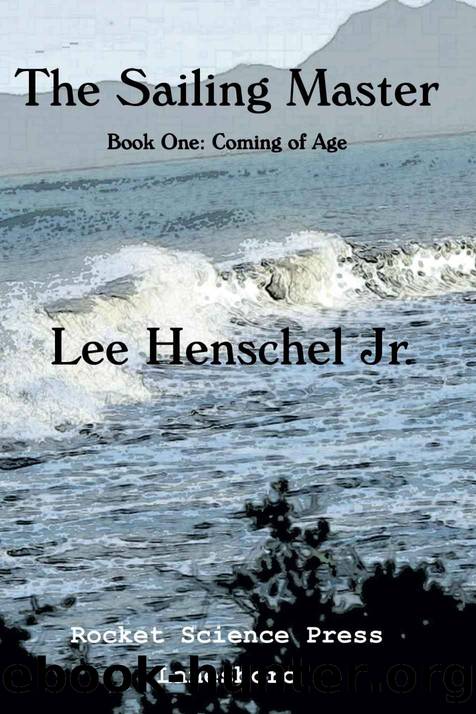The Sailing Master: Book One: Coming of Age by Lee Henschel

Author:Lee Henschel [Henschel, Lee]
Language: eng
Format: epub
Publisher: Rocket Science Press
Published: 2015-12-13T05:00:00+00:00
Back in Portsmouth Admiral Christchurch had described Gottlieb as a passenger with undeclared diplomatic status, and his business in Otra Nova as clandestine. The admiral requested and required Captain Cedric to avoid all contact with ships or shore after Cadiz. In order to still remain unseen Eleanor would need to lay well off Nagua, hull down if not completely below the horizon. To make contact with his agent, Gottlieb and I would be rowed ashore under the cover of darkness. A risky business though, to row a boat on open water, and even more so at night. A boat might easily lose its way.
Soon after the middle watch Eleanor wore ship, hauling her wind five miles off Nagua. The night went starry moonless. Gottlieb prepared us careful for the missionâdark clothing, faces and hands smudged with a stub of burnt cork and coal grease.
âWhat is this for, Gottlieb?â
âTo become the night, young Harriet. Come now. We shall wait on deck.â
Captain Cedric ordered the jolly boat into the water. Eleanorâs jolly was a bit larger than the gig and rowed by six men. It required a coxswain to command it, either a midshipmen or an officer. Our coxswain was Hoyer. He served in gunnery under Towerlight. I barely knew him.
We unhooked from Eleanor. Hoyer checked his compass and we wore away, due east. At Nagua two lanterns burned. The one to starboard was large and bright. It served the public dock. Hoyer checked his compass then made for that light, bearing slightly to port where there was a sand beach. The second lantern was farther to portâthe fish market. Just west of the fish market was the estuary of Bosc Creek. It was a salt bog, and to be avoided, as it was a most ruinous place to land a boat. It took an hour before Nagua took shape, its sparse waterfront rising dim in the night. A land breeze blew soft and the ebb tide ran as well.
I whispered to Gottlieb, âTheyâve pulled four hundred strokes already, sir.â
âYou are counting them, young Harriet?â
âNo, sir. I just know.â
The crew wore down. Hoyer referred to his compass then ordered rest for sets of oars, one pair at a time, keeping four oars working at all times. We made our way slow. But steady on, for the Eleanors were willing lads, and with hearts of oak.
Soon we closed on the beach and shipped oars. There was no surf so the bow men slipped quiet into the water, waist deep, and dragged our prow onto a narrow shelf. We disembarked and carried the jolly boat ashore and hid it in a stand of cypress. That final effort, heaving the jolly boat and concealing it, tapped the menâs reserve. Hoyer ordered all to rest while he took first watch.
The night slept . . . all shadows and silence. Gottlieb and I slipped away, moving through the cypress most slow. After a hundred yards we reached the coastal road and paused, watching and listening for travelers. But it was very late and the road was abandoned.
Download
This site does not store any files on its server. We only index and link to content provided by other sites. Please contact the content providers to delete copyright contents if any and email us, we'll remove relevant links or contents immediately.
In Control (The City Series) by Crystal Serowka(35378)
The Wolf Sea (The Oathsworn Series, Book 2) by Low Robert(33871)
We Ride Upon Sticks by Quan Barry(33307)
Crowbone (The Oathsworn Series, Book 5) by Low Robert(32353)
The Book of Dreams (Saxon Series) by Severin Tim(32258)
The Daughters of Foxcote Manor by Eve Chase(22306)
Trainspotting by Irvine Welsh(20085)
Call Me by Your Name by André Aciman(18991)
Shot Through The Heart (Supernature Book 1) by Edwin James(17934)
The Secret History by Donna Tartt(16662)
The Girl from the Opera House by Nancy Carson(14997)
Sad Girls by Lang Leav(13363)
American King (New Camelot #3) by Sierra Simone(13003)
Pimp by Iceberg Slim(12947)
All the Missing Girls by Megan Miranda(12775)
The Betrayed by Graham Heather(11715)
The Betrayed by David Hosp(11682)
4 3 2 1: A Novel by Paul Auster(11075)
Still Me by Jojo Moyes(9918)
